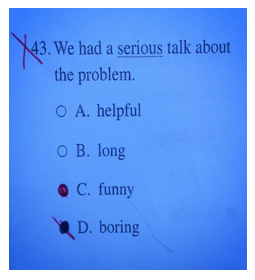THE BOSTICK REPORT-The photo (below) that accompanies this article was taken on my cell phone. It’s a recent practice test question that my second grade daughter brought home from school. The directions were simply to find the antonym of the underlined word.
Take a minute to read the question as it appears in the photo now and glance over the possible answers. I’ll wait.
I agree with the question. We do need to have a serious talk about the problem here. Clearly, the most basic and obvious antonym to the word serious is funny. It jumps right out of the pack to me and just sounds right. Funny fits as the antonym to serious like black fits white, up fits down, go fits stop, and countless others.
When I asked why my daughter why she picked the word ‘boring’, she said, “I like serious conversations.”
I immediately turned the NPR off. Then it hit me like a pledge drive.
My daughter once threw down the name Steve Chiotakis in a conversation. Unprovoked. Ask her what her favorite shows are on the weekend and she’ll tell you, in this order, “Wait, Wait, Don’t Tell Me”, “Car Talk”, “Delicious Dish”, “’This American Life”, and “Snap Judgment”.
Actually, strike that. She’s a kid. Her favorites, in order, change from day to day, so she might call out “Snap Judgment” as her FAVORITE FAVORITE one day and then leave it off the list the next. She’s just seven years old and her opinions tend to be transitory on favorites these days. Give the kid a break.
She does consistently say really likes Kai Ryssdal’s voice a lot and she doesn’t really know why, but we’re not here to go down that pre-pubescent alley. At least, I’m not really ready for that.
 In the past, tests like the SAT or the ACT have been derided as inherently classist. Wealthy kids are better positioned to excel on these tests because they can pay for tutoring and to retake the test.
In the past, tests like the SAT or the ACT have been derided as inherently classist. Wealthy kids are better positioned to excel on these tests because they can pay for tutoring and to retake the test.
This advantage actually starts in 4th grade here in LA when well-heeled parents pay $1,200-2,000 for a tutor to come to their house for 3+ months to prepare their kids for the Independent School Entrance Exam (ISEE). This test gets them into Harvard Westlake or Archer School for Girls in 7th grade. I used to be that tutor.
Other usual complaints against standardized testing also harp on wealth gaps and cultural differences. These arguments focus on the unfairness of including nautical terms in a test question when kids from Watts aren’t typically overly familiar with yacht club. One recent essay question asked kids to debate the value of reality television shows whose producers fabricate emotional scenarios for their stars.
It’s easy to for many Westsiders to embrace those criticisms casually because they don’t really affect many of us. Honestly, West LA kids benefit from these biases.
Therefore, I’m here to scare rich West LA parents with a new reason to fight against standardized testing. It’s rooted in the question my daughter missed.
What is the antonym for ‘serious’? Most of us might say ‘funny’. But, if the other options included ‘boring’ and you held a joyous perspective of ‘serious’ questions – like my little princess, it makes perfectly good sense for you to pick ‘boring’ as the antonym.
I’m a teacher and used to make good money off test prepping for the ISEE here on the Westside, so I teach my daughter, if she were a client, how to choose ‘funny’ over ‘boring’ next time.
The key is to train your mind to consider the most superficial interpretation of the question. I would encourage her to think that the designers of this test are relying on the stereotypical American perspective on intelligent conversations. You see, in a corporate world where entertainment trumps academic debate and marketing is the new art form, ‘boring’ is the answer test designers expect her to choose.
If she was interested, I would then delve into the history of this perspective on academia and we would discuss the administration of President Andrew Jackson where the elitism of Founding Father John Adams was tossed aside for Jackson’s Era of the Common Man. We might discuss how this represented a positive shift towards more engagement with government, but also incited a cultural shift away from celebrating serious conversations and towards the sardonic American humor that has driven our film and television industry to dominate the world.
And then I would tell her that she should stop the kind of interpretive thinking that led her to choose boring instead of funny. I would let her know that I applaud her choice and agree with her that serious conversations are fun, but the test rewards you for looking at this differently.
I would train her mind to view these questions form the most generic, limited-scope perspective possible so that she would be able to know that the “right” answer was representative of the most commonly held-belief and that is that all serious discussions are boring.
We can all see where that’s wrong, can’t we? Can we all see how standardized testing might be training our kids to be generic thinkers? Can we all see how dangerous it is to institutionalize the concept that serious debates are boring, can’t we? Are we appropriately and righteously indignant now?
If not, think about this: my daughter won’t get into Harvard or Stanford unless she learns to think that serious talks are boring. And neither will yours.
(Odysseus Bostick is a Los Angeles teacher and former candidate for the Los Angeles City Council. He writes The Bostick Report for CityWatch.)
-cw
CityWatch
Vol 12 Issue 25
Pub: Mar 25, 2014




